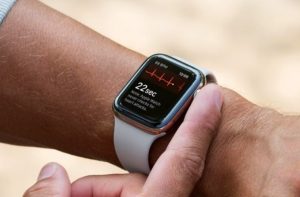E-health our companion of tomorrow
The health sector today presents many challenges: pandemic risks, aging of the population, unequal access to health care for all, gap between supply and demand, humanitarian issues, and drinking water. People’s expectations are high. However, the economic context and the chronic deficit generated by health expenditure complicate the response to these expectations. In recent years, the health sector has tended to digitize and new approaches combining technology and health are developing. We are talking about e-health , a market worth 4 billion euros this year.
E-health combines new information and communication technologies (NTIC) and activities in the medical world. Teleconsultation , driven by Doctolib, is one of the major elements. There is also tele-expertise, the information system in hospitals, connected objects, the development of online services… The State has announced an investment of 100 million euros to improve and digitize equipment. For example, part of the investment could be used to digitize vital cards.
- In what form will e-health conquer the medical sector?

The health sector is today facing a triple crisis
- The example of aging In 2050, more than one in four French people will be over 60 years old. Fruit of the baby boom, this projection has been known for many years, but its evolution seems to remain discreet. Indeed, aging is part of a fundamental trend, and many polling institutes forecast more than 24 million elderly people by 2050 .

However, while life expectancy is steadily increasing, healthy life expectancy seems to be stagnating. Also, the lengthening of life expectancy also leads to the multiplication of chronic pathologies such as:
- Diabetes
- heart failure
- Kidney failures
- Alzheimer’s
- The state of supply Demand is clearly higher than supply. Thus an imbalance is growing in terms of tools and manpower. As shown by the DREES study, 7 out of 10 general practitioners consider the number of doctors insufficient in their area of activity, and 53% refuse new patients as general practitioners .
In addition, the offer is very heterogeneous, some territories offer too many medical demography compared to the local population while other territories are medical deserts.
- Questions at the end of the crisis Lockdown has revealed the weaknesses of supply chains : transport or imports/exports are paralyzed. This blockage raises the question of the relocation of the production of certain strategic goods or even a reassessment of the question of the precautionary principle: masks, lack of medical equipment (respirator), and lack of space in hospitals.
The answer to all these problems: E-health
New methods must then be put in place to meet these expectations, but also to deal with this coronavirus crisis . The medical sector is a sector in full expansion and in search of new solutions , to combat the problems of tomorrow.
Expectations are high in terms of e-health:
- 72% of the population want to book appointments online
- 59% would like to have connected objects for better daily monitoring in the event of chronic illness
- 70% would like to access their medical records online
- 45% would prefer a vital card directly on their smartphone
We have been able to see this in particular through the massive use of telemedicine. Telemedicine has been developing for several years and tries to respond to the problems of Western societies. We call telemedicine the fact of connecting doctors with their patients remotely or with other doctors. Tele-expertise consists of using a high-level specialist remotely to respond to a problem. The current health crisis has increased the use of this type of device.
For a long time, telemedicine could not develop because of a complex and restrictive regulatory framework . However, the COVID-19 crisis has changed the legal framework . In France, we have gone from 75,000 consultations in 2019 to nearly 1 million per week in 2020. We are witnessing a normalization of the practice. Teleconsultations are now 100% reimbursed . Before the crisis, the French health system only covered 70% of the amount of these remote consultations.

Some state-of-the-art tools are being developed. 3D printing was developed during the first confinement to solve problems with the supply of materials such as visors for example. Moreover, the use of robotics , artificial intelligence, big data, are just a few examples of the speed, vivacity and density of innovations in the health sector. Between 2019 and 2023, the Global Health Outlook 2020 report predicts a 160% increase in the value of the global e-health market.
Finally, e-health has made its way into households. Before the health crisis, we saw daily offers of connected objects linked to health flourish. For example: connected watches today allow a brief analysis of the daily activity and vital parameters of its wearer. At the end of 2019, sales of the Apple Watch series 4 exceeded those of the Swiss watch industry.

The digitization of health is revolutionizing the work of thousands of players
At the end of 2017, a law concerning the dematerialization of documents in public health establishments was passed. This law promoted the integration of technology in daily work.

Numerous technologies make it possible to improve medical care and guarantee follow-up and quality of stay. This transformation can go through: Easier access to care : thanks to simplified appointment scheduling
A more fluid reception for patients : appointments can be made directly from home, an access ticket with a QR code will be issued to them, it will allow them to find their way when they arrive at reception. It is the touchscreen reception terminals that direct them to a service.
Improved collaboration between health personnel : through the use of applications . Medpics, is the first clinical case application, it allows you to exchange and share photos with other experts in the same field.
ESCadrille Toulouse Junior Conseil supports you in this transformation
With 42 years of experience , ESCadrille has developed in-depth expertise in the field of health and more particularly in its digitization.
This year ESCadrille notably carried out a mission for the MSA (Mutuelle Santé Agricole). The MSA contacted us to identify areas with understaffed doctors in Corsica and solve this problem. Indeed, medical deserts are a major health issue. Digitalization is one of the solutions to deal with the lack of rural doctors. One of our recommendations was therefore the development of telemedicine in the region. The objective was to provide a relevant response to the inequalities created by medical deserts, to allow the doctor to monitor a chronic pathology or even to analyze the results of an examination.
Finally, ESCadrille can support and advise you in your digital transformation. But also carry out market studies to better understand and identify health issues. Our young, ambitious and dynamic team will listen to your project and make your structure shine.
Article written by PAULINE LEROY, 2021.

